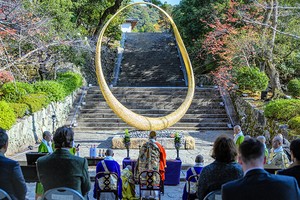THE ASAHI SHIMBUN
July 16, 2024 at 15:03 JST
Surface ocean temperatures in waters around the Japanese archipelago in the first half of this year were the highest since 1982, when records were first tracked, data from the Japan Meteorological Agency shows.
The Pacific Ocean off the coast of Hokkaido was particularly warm, which experts attributed to an abnormal flow of the Kuroshio Current.
The Asahi Shimbun analyzed JMA data on average sea surface temperatures for 10 sea areas near Japan taken roughly every 10 days for the past 43 years.
According to the data, the average sea surface temperature from January to June this year was 18.44 degrees.
This compares with the 18.18 degrees set in 1998, which was then a record.
It was also 1.06 degrees higher than the average for the period from 1991 to 2020, which is considered “normal.”
In particular, the surface water temperature in the sea area stretching east of Hokkaido in the first half of the year was 2.38 degrees higher than normal.
Toru Miyama, chief researcher of ocean physics at the Japan Agency for Marine-Earth Science and Technology (JAMSTEC), cited the abnormal flow of the Kuroshio Current as the cause.
The Kuroshio Current carries heat from the warm southern ocean. Normally, the Kuroshio Current turns around off the coast of Choshi, Chiba Prefecture, and flows away to the east.
However, from around the fall of 2020, it began to markedly move northward along Honshu, Japan’s main island, Miyama said.
This is believed to be due to the westerly winds taking a more northerly route than before, Miyama said.
This phenomenon is also believed to be related to global warming, he added.
The change has already affected fishing and other activities.
On April 3, nine drift-net fishing boats set out simultaneously for offshore salmon and trout fishing from the port at Habomai in Nemuro, Hokkaido. This year, the start of the fishing season was moved up one week from the previous year, an unusual measure.
The fishing grounds rich in chum salmon, pink salmon and sockeye salmon are located within 200 nautical miles of Japan.
“Due to rising sea temperatures, salmon and trout have become almost impossible to catch at the end of the fishing season in recent years,” said Kazuhiko Nakajima, 65, who is an executive director of a Sapporo-based fishermen’s association for Pacific small salmon and trout.
One of the causes of such anomalies in fishing grounds is “ocean heat waves,” a statistically rare phenomenon in which high sea water temperatures persist for more than five days.
The area off the eastern coast of Hokkaido to Sanriku is known as one where this phenomenon is particularly noticeable.
The northward movement of the Kuroshio Current prevents the cold Oyashio Current from moving southward, making ocean heat waves more likely to occur.
In the fall of 2021, the eastern coast of Hokkaido was hit by the worst red tide ever recorded.
Sea urchins, salmon and octopuses died in vast numbers.
Experts noted that the red tide was caused by an explosive increase in highly toxic phytoplankton triggered by changes in the undersea environment caused by an ocean heat wave in the summer of the same year.
Hiroshi Kuroda, a group leader of marine physics at the Japan Fisheries Research and Education Agency, said ocean heat waves have occurred frequently in waters around Japan from July to September in recent years and are now becoming more common.
“Compared with the early 1990s, the likelihood of ocean heat waves has increased about fourfold in the 2020s,” Kuroda said.
(This article was written by Tomoyuki Yamamoto and Ryoma Komiyama.)




















A peek through the music industry’s curtain at the producers who harnessed social media to help their idols go global.
A series based on diplomatic documents declassified by Japan’s Foreign Ministry
Here is a collection of first-hand accounts by “hibakusha” atomic bomb survivors.
Cooking experts, chefs and others involved in the field of food introduce their special recipes intertwined with their paths in life.
A series about Japanese-Americans and their memories of World War II